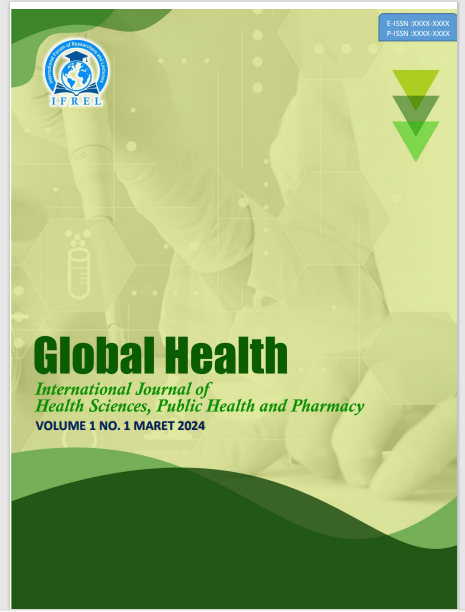Implementation of Physical Education, Sports and Health Learning at Madrasah of Miftahul Muta'alimin Islamic Boarding School, Cirebon Regency
DOI:
https://doi.org/10.70062/globalhealth.v2i3.228Keywords:
Descriptive Qualitative Research, Implementation, Islamic Boarding Schools, Madrasah PE Learning, MadrasahAbstract
This research aims to describe the implementation of Physical Education learning at Madrasah Pondok Pesantren Miftahul Muta'alimin (Miftahul Muta'alimin Islamic Boarding School). Learning implementation in this research includes planning, implementation, and assessment/evaluation, as well as the obstacles and supports that influence these implementations. This research used a descriptive qualitative approach. The data were obtained through interviews, observations, and documentation. The data validity was tested by using source triangulation. Observations and documentation were used as supporting data to strengthen the interview results. The research subjects consisted of the principals of Islamic Junior High Schools (MTs) and Islamic Junior High Schools (MA), a Physical Education teacher, and four students (two from each MTs and two from the MA). The data analysis was conducted through data reduction, data presentation, and conclusion drawing. The research findings indicate that the implementation of Physical Education learning has followed the planning, implementation, and evaluation stages, but has not been optimal. Planning remains administrative in nature and has not fully adapted to student characteristics. Learning implementation includes an introduction, core, and closing phase, but lacks of method variation and active student involvement. Assessment/evaluation has covered cognitive, affective, and psychomotor aspects, but it is still limited to final assessments and it is not yet sustainable. Furthermore, limited infrastructure and teacher backgrounds pose challenges. Despite this, madrasah and Islamic boarding schools (pesantren) generally support the implementation of Physical Education (PE) learning.
References
Ainiyah, Q., Fatikah, N., & Daniati, Y. F. (2022). The concept of implementation of Amaly Tafsir learning and its relation to the understanding of verses on fiqh. Science: Journal of Islamic Religious Education Studies, 4(1), 71–87. https://doi.org/10.54437/ilmuna.v4i1.407
Akbar, R. N., & Doewes, M. (2018). Sports in the Islamic boarding school environment. Sports in Islamic Boarding School Environment, 1(1), 4–7.
Al Fathan, K. M., Andriani, K. M., Nurjanah, M., Munawaroh, R. Z., & Dewi, D. T. (2022). Analysis of sports and health physical education materials (PJOK) for elementary schools. Educative: Journal of Educational Sciences, 4(5), 6914–6921. https://doi.org/10.31004/edukatif.v4i5.3392
Alfajri, M. F., & Hadi, M. S. (2024). The role of sports teachers in encouraging student participation in sports and physical activities in Muhammadiyah Al Mujahidin Junior High School, 2120–2128.
Balaka, Y. (2020). Theoretical and application research methodology. Widina Bhakti Persada.
Dahlan, A. (2019). Hakikat pendidikan jasmani. Antimicrobial Agents and Chemotherapy, 58(12), 7250–7257.
Fadli, M. R. (2021). Understand the design of qualitative research methods. Humanics, 21(1), 33–54. https://doi.org/10.21831/hum.v21i1.38075
Farida, A., & Supriyono. (2024). Implementation of physical education teaching in the independent learning curriculum in grade II and V elementary schools in Belik District, Belik Regency in 2023. Indonesian Journal for Physical Education and Sport, 5(1), 209–218.
Fatah, R. (2018). Implementasi pembelajaran. Journal of Chemical Information and Modeling, 53(9), 30.
Fiantika, et al. (2022). Qualitative research methodology. Rake Sarasin.
Irvansyah, D., Nur Wahyudi, A., & Darumoyo, K. (2023). Implementation of the independent learning curriculum in PJOK learning. Porkes Journal, 6(2), 322–342. https://doi.org/10.29408/porkes.v6i2.17213
Lestari, Y. A., & Purwanti, M. (2011). Pedagogic and professional competency relationships, social and personality at guru sekolah nonformal X. Journal of Physics A: Mathematical and Theoretical, 44(8), 1–14. https://doi.org/10.1088/1751-8113/44/8/085201
Lisa, N. (2023). Implementation of behaviorism theory in learning moral beliefs at MIS Al Hunafa Palangka Raya. Al Qodiri: Journal of Education, Social and Religious, 20(3), 759–766. http://ejournal.kopertais4.or.id/tapalkuda/index.php/qodiri/article/view/5107
Lukman, A. (2020). Madrasah education management dynamics and comparative studies: Madrasah from time to time. http://repository.iaincurup.ac.id/155/1/manajemen
Maulidah, N. A., Diaman, & Kosim, N. (2022). The nature and mission of madrasah education in Indonesia. Collaborative Journal of Science, 5(11), 772–779. https://doi.org/10.56338/jks.v5i11.2977
Nugroho, W., & Winarni, G. (2023). Development of web-based PJOK learning media in grade IV elementary school. Indonesian Journal of Physical Education, 19(2), 17–28.
Pambudi, B. D., & Wijaya, A. (2024). The effect of small games on students’ active participation in PJOK learning at SMA Kemala Bhayangkari 1 Surabaya. Journal of Tambusai Education, 8(1), 1869–1875.
Pratama, Y. A. (2019). Integration of madrasah education in the national education system: Study of madrasah education policy in Indonesia. Al-Tadzkiyyah: Journal of Islamic Education, 10(1), 95–112. https://doi.org/10.24042/atjpi.v10i1.3838
Putranto, A. D., & Efendi, M. Y. (2024). The importance of physical fitness to increase body strength in participating in learning and teaching activities at Dharma Karya UT Junior High School, 2009–2013. Muhammadiyah University Jakarta.
Saitya, I. (2022). The importance of learning planning in physical education, sports, and health lessons. Journal of Sports Education, 1(1), 1–5. https://jurnal.habi.ac.id/index.php/Pior
Setiawan, I. M. (2021). Availability of teachers, facilities, and learning infrastructure for physical education, sports, and health in elementary schools. Journal of Sports Science Undiksha, 9(1), 18–24. https://ejournal.undiksha.ac.id/index.php/JJIK/article/view/30976
Sidiq, U. (2018). Manajemen madrasah. Journal of Interactive Advertising, 10(10). http://www.sciencedirect.com/science/article/pii/S0160738315000444
Sidiq, U., & Choiri, M. (2019). Qualitative research methods in the field of education. IAIN Ponorogo. http://repository.iainponorogo.ac.id/484/1/metode
Syarifudin, S. W. (2022). Physical education and health, sports, and health (Vol. 1).
Taqwim, R. I., & Winarno, M. E. (2020). Implementation of physical education learning. Jurnal Pendidikan: Teori, Penelitian, dan Pengembangan, 5(3), 395–401. https://doi.org/10.17977/jptpp.v5i3.13303
Umar, S. (2018). Manajemen madrasah. Journal of Interactive Advertising, 10(10).
Wartulas, S. (2020). Elementary school assessment. DIALECTICS Journal of Basic Education Thought and Research, 10(2), 506–522.
Watikasari, S. U., Physical, P., & Kesehatan, O. D. A. N. (2023). Development of web-based physical education media model for class IV at SD Negeri 03 OKU.
Downloads
Published
How to Cite
Issue
Section
License
Copyright (c) 2025 Global Health: Journal of Health Sciences, Public Health and Pharmacy

This work is licensed under a Creative Commons Attribution-ShareAlike 4.0 International License.





